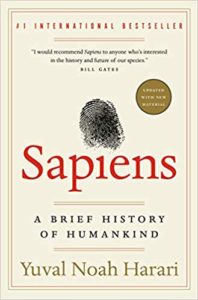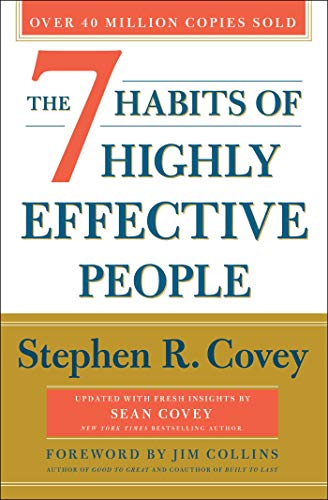Sapiens: A Brief History of Humankind

Book: Sapiens: A Brief History of Humankind
Author: Yuval Noah Harari
Year Published: 2014
Book Summary
TOPLINE
Sapiens is a brilliant book with a vast canvas. It traces the history of Humankind through its evolution from the Stone Age right up to the twenty-first century.
Yuval Noah Harari fleshes out how Humankind has come to dominate the planet, how the evolution of Homo Sapiens has helped shape our lives, and how we can think about the future to come.
In Sapiens, Harari uses concepts from evolutionary biology, history, sociology, and anthropology to tell the story of our species’ journey from our multi-species past to our current species exclusivity.
The book states that Humankind prevailed through happenstance. Its ability drives its dominance for language, and the capacity to create and believe in shared fictions.
Consider this simple fact there are hundreds even thousands of species and subspecies amongst all animals. Yet there is only one species of Humans. Sapiens being the only human species, wasn’t always the case, from eight known Homo species, only one, ‘Sapiens’ has survived.
Further, Sapiens occupies a position at the very top of the food chain. The question to ask, therefore, is, how did this happen?
Humans first evolved in Africa approximately 2.5 million years ago. Harari builds the thesis in the book’s closing that it appears unlikely that Homo sapiens will be able to survive on planet earth for another 1,000 years.
The book examines why!
BOOK SUMMARY
The History of Homo Sapiens has three significant revolutions that helped set the stage for where we stand in history, at this time: The Cognitive Revolution, which started modern History, commenced about 70,000 years ago. The Agricultural Revolution occurred about 12,000 years ago, and the Scientific Revolution only about 500 years ago.
The Scientific revolution may well end history, starting perhaps a trans-human future. The book Sapiens tells the story of the evolution of Humankind through these revolutions and how these three revolutions have affected human life and that of other creatures that co-inhabit the planet with us.
2.5 million years ago, Homos started as an animal of no special significance. Homos like other apes foraged for plants, small insects/animals, carrion from carnivores, and occasionally hunted larger game.
In the beginning, all Homo species lived on the Afro-Asian landmass. Homo Sapiens were just one of the eight Homo species. Around 70,000 years ago, Homo sapiens began the split away from other species. The next landmark came about 45,000 years ago when Sapiens started their migration to other continents. Their journeys of migration appear to have been simultaneously accompanied by massive extinction of species around the world, including all other Homo species.
THE COGNITIVE REVOLUTION
The cognitive revolution started about 70,000 years ago. At this time, Homo Sapiens had no specific superiority to any other Homo species. The cognitive revolution involved the development of language. The salient features of the cognitive revolution were:
- Flexible language: Sapiens developed a new language. This new language of the Sapiens was more complex and went far beyond the simple communication language of other apes.
- Gossip: This was not the negative that gossip might be today. It was instead the ability to convey information about other people as a method of building trust. This aspect of language was vital for cooperation.
- Shared Fiction: The development of language led to the ability of Sapiens to create myths and shared or collective fiction that everyone believed in. This shared fiction includes ideas about Religion, Money, etc.
The Rule of 150:
Harari suggests that the difference between the species has to do with the cognitive abilities of Sapiens. When other species such as Monkeys form groups, their numbers tend to max out for one group at around 150.
Through shared myth and fiction, Sapiens can create groups far more substantial than 150 and use those large group numbers to assert its dominance brutally.
Further, there are also very few instances when monkeys from two groups might combine forces to attack a third group of monkeys. Yet Sapiens can do all of this and more.
This cognitive ability helped Sapiens dominate not only other species of animals but also other species of humans. Sapiens prevailed where the Neanderthals, the other homo species, did not.
These cognitive abilities and the belief in shared fiction are the basis of our shared myths about Religion, Money, Nationalism, Political systems, etc.
THE AGRICULTURAL REVOLUTION
The agricultural revolution started bout 10,000 years ago. In this phase, Sapiens began to shift away from their forager lifestyles to a lifestyle that revolved around agriculture.
- The Circle of Wheat: Wheat and other grains became easy to grow once the climate became more temperate, as the Ice age retreated. Initially, the forager bands would hang around a patch of wheat they produced, for a few weeks of plenty, and then move on. Over the generations, the encampments around the wheat-growing areas became more permanent.
- An explosion of Population: The Agricultural revolution was to make a massive impact on the Sapiens. In terms of population Sapiens went from approximately 5 million foragers in 10,000 BC to about 250 million at the turn of the first century AD.
- History’s biggest fraud: Harari makes the case that the Agricultural Revolution was perhaps history’s biggest fraud. The Agricultural Revolution did result in increased food production, but at the same time, it resulted in massive population growth. The surplus production that agriculture generated went to a small elite, while it forced the average farmer into a cycle of continuously arduous labor.
The Agricultural Revolution also resulted in a loss of skills that Sapiens possessed as foragers. The quality and variety of their food suffered as well since the diet of a settled farming community is much more monotonous than the varied diet of a forager.
Not only did the life of the typical farmer become more onerous due to demands of labor needed in farming, but The Agricultural Revolution also became the watershed when Sapiens began to worry about the future. About the weather, about crop yields, about how to increase production, etc. The life of a peasant is much less secure than that of a forager.
The three great unifiers of Humankind: Money, Empires & Religion
MONEY
Most societies developed a medium of exchange over time. This medium of exchange is Money. Money could be cowrie shells, silver shekels, or equally coins and banknotes. Money could be anything that people are willing to accept and use to possess a systematically arrived value of things for the exchange of goods or services.
Money acts as a universal medium for even complete strangers to cooperate and conduct transactions with each other.
Money is, therefore, a system of mutual trust. It is perhaps the most universal and most efficient system of mutual trust ever devised.
Yet, Money too is shared fiction. The idea of Money is entirely an intellectual construct. Money doesn’t exist, except in our minds.
EMPIRES
Empires have been the most common political system in the last 2,500 years. Empires brought with them wars, conquests, and oppression of the subjugated people. Yet over time, Empires also brought cultural convergence.
In fact, over time, the conquered people adopted elements from the conqueror’s culture, to the extent that these cultural elements became a new hybrid culture of the conquered nations. In time, these nations saw this hybrid culture as their very own.
A conventional narrative might suggest that empires decline and fall because of uprisings. On the contrary, Empires almost always crumble either due to external invasions or due to the splitting and fragmentation of the ruling structure of the Empire.
RELIGION
The Agricultural Revolution also brought with it the advent of Religion. The impact of Religion’s arrival was no less a revolution. Harari walks the reader through how Sapiens adopted and developed religions with descriptors like Animism, Polytheism, Dualism, Monotheism, Syncretism, and Humanism.
Harari sees Polytheism as inherently open-minded. It is more accepting of other Gods and rarely persecutes ‘heretics’ and ‘infidels.’
Monotheism, on the other hand, while differentiating itself from Polytheism struggles with a central tension. This tension is about the idea of the omnipotent God that cares for all Humankind, yet allows evil to occur?
Interestingly Harari makes the case that Liberalism, Conservatism, Communism, Capitalism, Nationalism, etc. are nothing but modern-day natural law religions.
THE SCIENTIFIC REVOLUTION
The Scientific Revolution, according to Harari, started around 500 years ago and is still underway.
Discoveries and Technological innovation are increasingly giving Sapiens more power and influence over their future.
- Homo Deus: We are at a stage of the Scientific Revolution that we have within our grasp the potential to be gods, and to be able to create artificial life. There is a real possibility of the Homo Sapiens becoming Homo Deus.
- The End of History: Harari believes that the story of Sapiens may be coming to an end, perhaps soon, in the time of the next hundred years.
Aided by new technology, Harari makes the case, that the species is likely to outgrow its hominid self. He is uneasy about the very idea of Sapiens as the designers of intelligent life – a superhuman machine, that may find alien the concept of happiness!
At the same time, history is marching inexorably toward global unity. It appears the entire planet is moving toward one world culture.
The challenge Harari believes is that Sapiens do not know what they want.
The real question facing us he posits, is not ‘What do we want to become?’, but instead ‘What do we want to want?’
This question’s answer might help decide what the future holds in the next chapter of the History of Sapiens.
MY RECOMMENDATION
Sapiens is an extremely well-written book that sweeps through the historical development of Humankind through the Cognitive, Agricultural, and Scientific Revolutions.
I would recommend this book to anyone with a thirst for knowledge about Human History and the arc of human experience.
Equally, I would recommend this book to anyone who has an interest in understanding the sociological insights behind the development of Money, Religion, and what makes Empires successful.
Finally, this book would be particularly useful for the student and the business executive alike.
I would like to acknowledge that Sapiens has its share of critics who accuse Harari of sensationalism or of making often unsourced assertions. I nonetheless see this book as a grand telling of the History of Humankind, and a must-read for anyone with interest in the Sapiens story.
Link To Author: Yuval Noah Harari




